

Impact of Racism on USA. In recent years there has been a campaign to educate Americans as to the nature of physical addictions to chemical substances, such as alcohol.
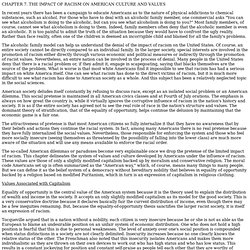
For those who have to deal with an alcoholic family member, one commercial asks "You can see what alcoholism is doing to the alcoholic, but can you see what alcoholism is doing to you? " Most family members, of course, cannot see what alcoholism is doing to them. Indeed, family members often deny that the alcoholic member is even an alcoholic. It is too painful to admit the truth of the situation because they would have to confront the ugly reality. Rather than face reality, often one of the children is deemed an incorrigible child and blamed for all the family's problems. The alcoholic family model can help us understand the denial of the impact of racism on the United States.
American society deludes itself constantly by refusing to discuss race, except as an isolated social problem or an American dilemma. Modern Racism and Its Psychosocial Effects on Society – including a discussion about bilingual education « Bilingualeducationmass’s Weblog. Modern Racism and Its Psychosocial Effects on Society by Neil Brick by Neil Brick MA Ed.

Author E-mail: neilesl@aol.com This paper will describe and delineate the effects of modern racism on society from a psychological perspective. It will define different forms of racism and the effects of racism on the different parts and aspects of society. I will discuss how modern racism may be a step between overt forms of racism and the elimination of racism. Racism is defined as an individual’s discriminatory behavior and prejudicial attitude toward people of a certain race or institutional practices (whether motivated by prejudice or not) that subordinate a certain race’s people. Sherman believes modern racism has evolved from aggressive prejudicial behavior to a more subtle form. Aronson, Wilson and Akert define modern racism as acting unprejudiced while maintaining prejudiced attitudes.
Modern racism also exists in other countries. 73% stated the Black man was acting violently. References. What Is Behaviorism - An Introduction to Behaviorism. Question: What Is Behaviorism?
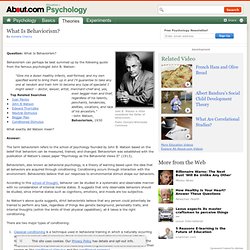
Behaviorism can perhaps be best summed up by the following quote from the famous psychologist John B. Watson: "Give me a dozen healthy infants, well-formed, and my own specified world to bring them up in and I'll guarantee to take any one at random and train him to become any type of specialist I might select -- doctor, lawyer, artist, merchant-chief and, yes, even beggar-man and thief, regardless of his talents, penchants, tendencies, abilities, vocations, and race of his ancestors.
" Behavioral Psychology. Behaviorism. Behaviorism (or behaviourism), is the science of behavior that focuses on observable behavior only,[1] it is also an approach to psychology that combines elements of philosophy, methodology, and theory.[2] It emerged in the early twentieth century as a reaction to "mentalistic" psychology, which often had difficulty making predictions that could be tested using rigorous experimental methods.

The primary tenet of behaviorism, as expressed in the writings of John B. Watson, B. F. Skinner, and others, is that psychology should concern itself with the observable behavior of people and animals, not with unobservable events that take place in their minds.[3] The behaviorist school of thought maintains that behaviors as such can be described scientifically without recourse either to internal physiological events or to hypothetical constructs such as thoughts and beliefs.[4] Versions[edit] Two subtypes are: Definition[edit] 7. How would you describe human relationships in modern society? Give examples to support your argument. From Wikipedia, the free encyclopedia: Modernity and the contemporary society: There is an ongoing debate about the relationship between modernity and present societies.
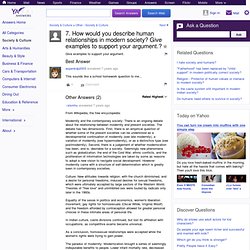
The debate has two dimensions. Human nature. The branches of contemporary science associated with the study of human nature include anthropology, sociology, sociobiology, and psychology, particularly evolutionary psychology, and developmental psychology.
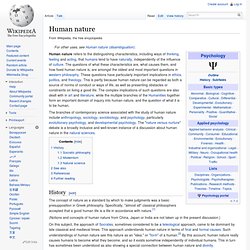
The "nature versus nurture" debate is a broadly inclusive and well-known instance of a discussion about human nature in the natural sciences. History[edit] The concept of nature as a standard by which to make judgments was a basic presupposition in Greek philosophy. Specifically, "almost all" classical philosophers accepted that a good human life is a life in accordance with nature.[1] Psychology History. Compiled by Julie Greathouse (May 1997) Biography Theory Time Line Bibliography Kurt Lewin is universally recognized as the founder of modern social psychology.
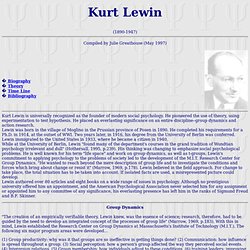
He pioneered the use of theory, using experimentation to test hypothesis. He placed an everlasting significance on an entire discipline--group dynamics and action research. Psychology History. Compiled by Charles Cowgil (May1997) Biography Theory Time Line Bibliography .......................................Jung's Handprint.
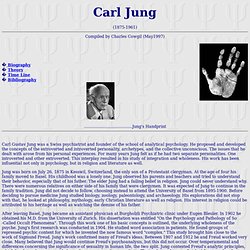
Ivan Pavlov - Biography. Ivan Petrovich Pavlov was born on September 14, 1849 at Ryazan, where his father, Peter Dmitrievich Pavlov, was a village priest.
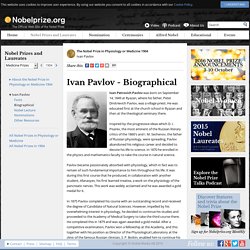
He was educated first at the church school in Ryazan and then at the theological seminary there. Inspired by the progressive ideas which D. I. Pisarev, the most eminent of the Russian literary critics of the 1860's and I. M. Pavlov became passionately absorbed with physiology, which in fact was to remain of such fundamental importance to him throughout his life. In 1875 Pavlov completed his course with an outstanding record and received the degree of Candidate of Natural Sciences. In 1890 Pavlov was invited to organize and direct the Department of Physiology at the Institute of Experimental Medicine. In 1890 Pavlov was appointed Professor of Pharmacology at the Military Medical Academy and five years later he was appointed to the then vacant Chair of Physiology, which he held till 1925.
Pavlov directed all his indefatigable energy towards scientific reforms. Sigmund Freud - Life and Work.